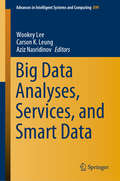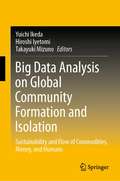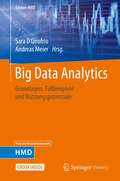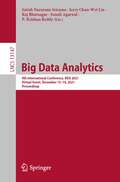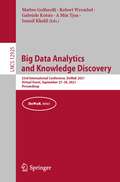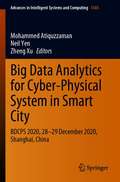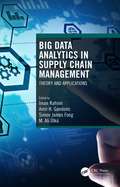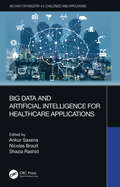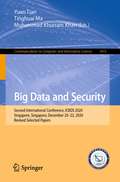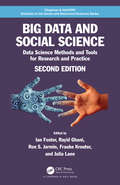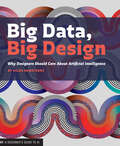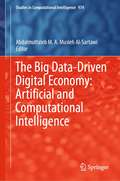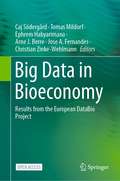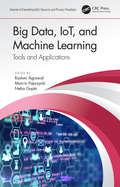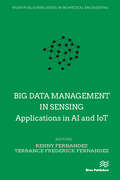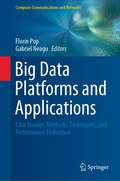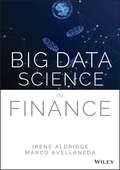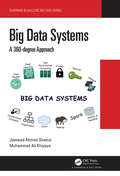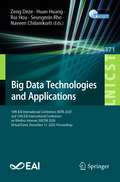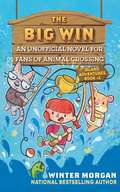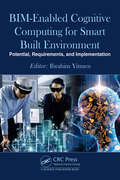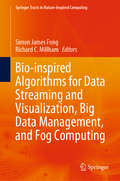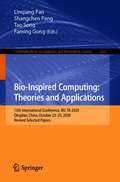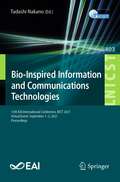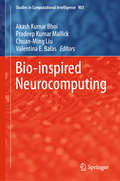- Table View
- List View
Big Data Analyses, Services, and Smart Data (Advances in Intelligent Systems and Computing #899)
by Wookey Lee Carson K. Leung Aziz NasridinovThis book covers topics like big data analyses, services, and smart data. It contains (i) invited papers, (ii) selected papers from the Sixth International Conference on Big Data Applications and Services (BigDAS 2018), as well as (iii) extended papers from the Sixth IEEE International Conference on Big Data and Smart Computing (IEEE BigComp 2019). The aim of BigDAS is to present innovative results, encourage academic and industrial interaction, and promote collaborative research in the field of big data worldwide. BigDAS 2018 was held in Zhengzhou, China, on August 19–22, 2018, and organized by the Korea Big Data Service Society and TusStar. The goal of IEEE BigComp, initiated by Korean Institute of Information Scientists and Engineers (KIISE), is to provide an international forum for exchanging ideas and information on current studies, challenges, research results, system developments, and practical experiences in the emerging fields of big data and smart computing. IEEE BigComp 2019 was held in Kyoto, Japan, on February 27–March 02, 2019, and co-sponsored by IEEE and KIISE.
Big Data Analysis on Global Community Formation and Isolation: Sustainability and Flow of Commodities, Money, and Humans
by Yuichi Ikeda Hiroshi Iyetomi Takayuki MizunoIn this book, the authors analyze big data on global interdependence caused by the flows of commodities, money, and people, using a network science approach to obtain differing views of globalization and to clarify the facts on isolation of communities. Globalization reduces international economic inequality, i.e., it allows emerging countries to catch up while it increases relative poverty in some advanced countries. How should this trade-off between international and domestic inequalities be resolved? At the same time, the reduction of biocultural diversity caused by globalization needs to be avoided. What kind of change is required in local communities to conserve biocultural diversity? On the issue of commodity flow, research results of the supply-chain network, isolation in industry, and resource flows and stocks are presented in this book. For monetary flow, ownership networks, value-added networks, and profit shifting were studied; and regarding the flow of people, linkage of ethnic groups, immigrant assimilation, and refugees were examined. Based on the resulting view of globalization and isolation, the development of the isolation index using machine learning is discussed. Finally, recommendations for evidence-based policymaking in the United Nations are considered.
Big Data Analytics: Grundlagen, Fallbeispiele und Nutzungspotenziale (Edition HMD)
by Andreas Meier Sara D'OnofrioMit diesem Herausgeberwerk führen die Autoren den Begriff „Big Data Analytics“ ein und geben Fallstudien aus unterschiedlichen Anwendungsgebieten. Unter Big Data Analytics wird das Aufbereiten, Analysieren und Interpretieren von großen, oft heterogenen Datenbeständen verstanden, mit dem Ziel, Muster und Zusammenhänge in den Daten aufzudecken und Entscheidungsgrundlagen für wissenschaftliche, betriebliche oder gesellschaftliche Fragestellungen zu erhalten. Nebst den theoretischen Grundlagen widmet sich das Herausgeberwerk der Vielfalt verschiedener Anwendungsmöglichkeiten. Fallbeispiele geben Einblick in die Anwendung von Big Data Analytics und dessen Nutzenpotenziale. Das Werk richtet sich gleichermaßen an Studierende, Fachleute aller Fachrichtungen als auch an interessierte Anwender. Es hilft den Leserinnen und Leser, die Bedeutungsvielfalt des Begriffs Big Data Analytics zu verstehen und verschiedene Einsatzmöglichkeiten im eigenen Umfeld zu erkennen und zu bewerten.
Big Data Analytics: 9th International Conference, BDA 2021, Virtual Event, December 15-18, 2021, Proceedings (Lecture Notes in Computer Science #13147)
by Satish Narayana Srirama Jerry Chun-Wei Lin Raj Bhatnagar Sonali Agarwal P. Krishna ReddyThis book constitutes the proceedings of the 8th International Conference on Big Data Analytics, BDA 2021, which took place during December 2021. Due to COVID-19 pandemic the conference was held virtually. The 16 full and 3 short papers included in this volume were carefully reviewed and selected from 41 submissions. The contributions were organized in topical sections named as follows: medical and health applications; machine/deep learning; IoTs, sensors, and networks; fundamentation; pattern mining and data analytics.
Big Data Analytics and Knowledge Discovery: 23rd International Conference, DaWaK 2021, Virtual Event, September 27–30, 2021, Proceedings (Lecture Notes in Computer Science #12925)
by Matteo Golfarelli Robert Wrembel Gabriele Kotsis A Min Tjoa Ismail KhalilThis volume LNCS 12925 constitutes the papers of the 23rd International Conference on Big Data Analytics and Knowledge Discovery, held in September 2021. Due to COVID-19 pandemic it was held virtually. The 12 full papers presented together with 15 short papers in this volume were carefully reviewed and selected from a total of 71 submissions.The papers reflect a wide range of topics in the field of data integration, data warehousing, data analytics, and recently big data analytics, in a broad sense. The main objectives of this event are to explore, disseminate, and exchange knowledge in these fields.
Big Data Analytics for Cyber-Physical System in Smart City: BDCPS 2020, 28-29 December 2020, Shanghai, China (Advances in Intelligent Systems and Computing #1303)
by Mohammed Atiquzzaman Neil Yen Zheng XuThis book gathers a selection of peer-reviewed papers presented at the second Big Data Analytics for Cyber-Physical System in Smart City (BDCPS 2020) conference, held in Shanghai, China, on 28–29 December 2020. The contributions, prepared by an international team of scientists and engineers, cover the latest advances made in the field of machine learning, and big data analytics methods and approaches for the data-driven co-design of communication, computing, and control for smart cities. Given its scope, it offers a valuable resource for all researchers and professionals interested in big data, smart cities, and cyber-physical systems.
Big Data Analytics in Supply Chain Management: Theory and Applications
by Iman Rahimi, Amir H. Gandomi, Simon James Fong, and M. Ali ÜlküIn a world of soaring digitization, social media, financial transactions, and production and logistics processes constantly produce massive data. Employing analytical tools to extract insights and foresights from data improves the quality, speed, and reliability of solutions to highly intertwined issues faced in supply chain operations.From procurement in Industry 4.0 to sustainable consumption behavior to curriculum development for data scientists, this book offers a wide array of techniques and theories of Big Data Analytics applied to Supply Chain Management. It offers a comprehensive overview and forms a new synthesis by bringing together seemingly divergent fields of research. Intended for Engineering and Business students, scholars, and professionals, this book is a collection of state-of-the-art research and best practices to spur discussion about and extend the cumulant knowledge of emerging supply chain problems.
Big Data and Artificial Intelligence for Healthcare Applications (Big Data for Industry 4.0)
by Ankur Saxena, Nicolas Brault, and Shazia RashidThis book covers a wide range of topics on the role of Artificial Intelligence, Machine Learning, and Big Data for healthcare applications and deals with the ethical issues and concerns associated with it. This book explores the applications in different areas of healthcare and highlights the current research. The book covers healthcare big data analytics, mobile health and personalized medicine, clinical trial data management and presents how Artificial Intelligence can be used for early disease diagnosis prediction and prognosis. It also offers some case studies that describes the application of Artificial Intelligence and Machine Learning in healthcare. This book will be useful for researchers, healthcare professionals, data scientists, systems engineers, students, programmers, clinicians, and policymakers.
Big Data and Security: Second International Conference, ICBDS 2020, Singapore, Singapore, December 20–22, 2020, Revised Selected Papers (Communications in Computer and Information Science #1415)
by Yuan Tian Tinghuai Ma Muhammad Khurram KhanThis book constitutes the refereed proceedings of the Second International Conference on Big Data and Security, ICBDS 2020, held in Singapore, Singapore, in December 2020.The 44 revised full papers and 8 short papers were carefully reviewed and selected out of 153 submissions. The papers included in this book are orfanized according to the topical sections on cybersecurity and privacy, big data, blockchain and internet of things, and artificial intelligence/ machine learning security.
Big Data and Social Science: Data Science Methods and Tools for Research and Practice (Chapman & Hall/CRC Statistics in the Social and Behavioral Sciences)
by Ian Foster, Rayid Ghani, Ron S. Jarmin, Frauke Kreuter and Julia LaneBig Data and Social Science: Data Science Methods and Tools for Research and Practice, Second Edition shows how to apply data science to real-world problems, covering all stages of a data-intensive social science or policy project. Prominent leaders in the social sciences, statistics, and computer science as well as the field of data science provide a unique perspective on how to apply modern social science research principles and current analytical and computational tools. The text teaches you how to identify and collect appropriate data, apply data science methods and tools to the data, and recognize and respond to data errors, biases, and limitations. Features: Takes an accessible, hands-on approach to handling new types of data in the social sciences Presents the key data science tools in a non-intimidating way to both social and data scientists while keeping the focus on research questions and purposes Illustrates social science and data science principles through real-world problems Links computer science concepts to practical social science research Promotes good scientific practice Provides freely available workbooks with data, code, and practical programming exercises, through Binder and GitHub New to the Second Edition: Increased use of examples from different areas of social sciences New chapter on dealing with Bias and Fairness in Machine Learning models Expanded chapters focusing on Machine Learning and Text Analysis Revamped hands-on Jupyter notebooks to reinforce concepts covered in each chapter This classroom-tested book fills a major gap in graduate- and professional-level data science and social science education. It can be used to train a new generation of social data scientists to tackle real-world problems and improve the skills and competencies of applied social scientists and public policy practitioners. It empowers you to use the massive and rapidly growing amounts of available data to interpret economic and social activities in a scientific and rigorous manner.
Big Data, Big Design: Why Designers Should Care about Artificial Intelligence
by Helen ArmstrongBig Data, Big Design provides designers with the tools they need to harness the potential of machine learning and put it to use for good through thoughtful, human-centered, intentional design.Enter the world of Machine Learning (ML) and Artificial Intelligence (AI) through a design lens in this thoughtful handbook of practical skills, technical knowledge, interviews, essays, and theory, written specifically for designers. Gain an understanding of the design opportunities and design biases that arise when using predictive algorithms. Learn how to place design principles and cultural context at the heart of AI and ML through real-life case studies and examples. This portable, accessible guide will give beginners and more advanced AI and ML users the confidence to make reasoned, thoughtful decisions when implementing ML design solutions.
The Big Data-Driven Digital Economy: Artificial and Computational Intelligence (Studies in Computational Intelligence #974)
by Abdalmuttaleb M. A. Musleh Al-SartawiThis book shows digital economy has become one of the most sought out solutions to sustainable development and economic growth of nations. This book discusses the implications of both artificial intelligence and computational intelligence in the digital economy providing a holistic view on AI education, economics, finance, sustainability, ethics, governance, cybersecurity, blockchain, and knowledge management. Unlike other books, this book brings together two important areas, intelligence systems and big data in the digital economy, with special attention given to the opportunities, challenges, for education, business growth, and economic progression of nations. The chapters hereby focus on how societies can take advantage and manage data, as well as the limitations they face due to the complexity of resources in the form of digital data and the intelligence which will support economists, financial managers, engineers, ICT specialists, digital managers, data managers, policymakers, regulators, researchers, academics, students, economic development strategies, and the efforts made by the UN towards achieving their sustainability goals.
Big Data in Bioeconomy: Results from the European DataBio Project
by Christian Zinke-Wehlmann Caj Södergård Tomas Mildorf Ephrem Habyarimana Arne J. Berre Jose A. FernandesThis edited open access book presents the comprehensive outcome of The European DataBio Project, which examined new data-driven methods to shape a bioeconomy. These methods are used to develop new and sustainable ways to use forest, farm and fishery resources. As a European initiative, the goal is to use these new findings to support decision-makers and producers – meaning farmers, land and forest owners and fishermen.With their 27 pilot projects from 17 countries, the authors examine important sectors and highlight examples where modern data-driven methods were used to increase sustainability. How can farmers, foresters or fishermen use these insights in their daily lives? The authors answer this and other questions for our readers. The first four parts of this book give an overview of the big data technologies relevant for optimal raw material gathering. The next three parts put these technologies into perspective, by showing useable applications from farming, forestry and fishery. The final part of this book gives a summary and a view on the future.With its broad outlook and variety of topics, this book is an enrichment for students and scientists in bioeconomy, biodiversity and renewable resources.
Big Data, IoT, and Machine Learning: Tools and Applications (Internet of Everything (IoE))
by Rashmi Agrawal, Marcin Paprzycki, Neha GuptaThe idea behind this book is to simplify the journey of aspiring readers and researchers to understand Big Data, IoT and Machine Learning. It also includes various real-time/offline applications and case studies in the fields of engineering, computer science, information security and cloud computing using modern tools. This book consists of two sections: Section I contains the topics related to Applications of Machine Learning, and Section II addresses issues about Big Data, the Cloud and the Internet of Things. This brings all the related technologies into a single source so that undergraduate and postgraduate students, researchers, academicians and people in industry can easily understand them. Features Addresses the complete data science technologies workflow Explores basic and high-level concepts and services as a manual for those in the industry and at the same time can help beginners to understand both basic and advanced aspects of machine learning Covers data processing and security solutions in IoT and Big Data applications Offers adaptive, robust, scalable and reliable applications to develop solutions for day-to-day problems Presents security issues and data migration techniques of NoSQL databases
Big data management in Sensing: Applications in AI and IoT
by Renny Fernandez Terrance Frederick FernandezThe book is centrally focused on human computer Interaction and how sensors within small and wide groups of Nano-robots employ Deep Learning for applications in industry. It covers a wide array of topics that are useful for researchers and students to gain knowledge about AI and sensors in nanobots. Furthermore, the book explores Deep Learning approaches to enhance the accuracy of AI systems applied in medical robotics for surgical techniques. Secondly, we plan to explore bio-nano-robotics, which is a field in nano-robotics, that deals with automatic intelligence handling, self-assembly and replication, information processing and programmability.
Big Data Platforms and Applications: Case Studies, Methods, Techniques, and Performance Evaluation (Computer Communications and Networks)
by Florin Pop Gabriel NeaguThis book provides a review of advanced topics relating to the theory, research, analysis and implementation in the context of big data platforms and their applications, with a focus on methods, techniques, and performance evaluation. The explosive growth in the volume, speed, and variety of data being produced every day requires a continuous increase in the processing speeds of servers and of entire network infrastructures, as well as new resource management models. This poses significant challenges (and provides striking development opportunities) for data intensive and high-performance computing, i.e., how to efficiently turn extremely large datasets into valuable information and meaningful knowledge.The task of context data management is further complicated by the variety of sources such data derives from, resulting in different data formats, with varying storage, transformation, delivery, and archiving requirements. At the same time rapid responses are needed for real-time applications. With the emergence of cloud infrastructures, achieving highly scalable data management in such contexts is a critical problem, as the overall application performance is highly dependent on the properties of the data management service.
Big Data Science in Finance
by Irene Aldridge Marco AvellanedaExplains the mathematics, theory, and methods of Big Data as applied to finance and investing Data science has fundamentally changed Wall Street—applied mathematics and software code are increasingly driving finance and investment-decision tools. Big Data Science in Finance examines the mathematics, theory, and practical use of the revolutionary techniques that are transforming the industry. Designed for mathematically-advanced students and discerning financial practitioners alike, this energizing book presents new, cutting-edge content based on world-class research taught in the leading Financial Mathematics and Engineering programs in the world. Marco Avellaneda, a leader in quantitative finance, and quantitative methodology author Irene Aldridge help readers harness the power of Big Data. Comprehensive in scope, this book offers in-depth instruction on how to separate signal from noise, how to deal with missing data values, and how to utilize Big Data techniques in decision-making. Key topics include data clustering, data storage optimization, Big Data dynamics, Monte Carlo methods and their applications in Big Data analysis, and more. This valuable book: Provides a complete account of Big Data that includes proofs, step-by-step applications, and code samples Explains the difference between Principal Component Analysis (PCA) and Singular Value Decomposition (SVD) Covers vital topics in the field in a clear, straightforward manner Compares, contrasts, and discusses Big Data and Small Data Includes Cornell University-tested educational materials such as lesson plans, end-of-chapter questions, and downloadable lecture slides Big Data Science in Finance: Mathematics and Applications is an important, up-to-date resource for students in economics, econometrics, finance, applied mathematics, industrial engineering, and business courses, and for investment managers, quantitative traders, risk and portfolio managers, and other financial practitioners.
Big Data Systems: A 360-degree Approach
by Jawwad Ahmad ShamsiBig Data Systems encompass massive challenges related to data diversity, storage mechanisms, and requirements of massive computational power. Further, capabilities of big data systems also vary with respect to type of problems. For instance, distributed memory systems are not recommended for iterative algorithms. Similarly, variations in big data systems also exist related to consistency and fault tolerance. The purpose of this book is to provide a detailed explanation of big data systems. The book covers various topics including Networking, Security, Privacy, Storage, Computation, Cloud Computing, NoSQL and NewSQL systems, High Performance Computing, and Deep Learning. An illustrative and practical approach has been adopted in which theoretical topics have been aided by well-explained programming and illustrative examples. Key Features: Introduces concepts and evolution of Big Data technology. Illustrates examples for thorough understanding. Contains programming examples for hands on development. Explains a variety of topics including NoSQL Systems, NewSQL systems, Security, Privacy, Networking, Cloud, High Performance Computing, and Deep Learning. Exemplifies widely used big data technologies such as Hadoop and Spark. Includes discussion on case studies and open issues. Provides end of chapter questions for enhanced learning.
Big Data Technologies and Applications: 10th EAI International Conference, BDTA 2020, and 13th EAI International Conference on Wireless Internet, WiCON 2020, Virtual Event, December 11, 2020, Proceedings (Lecture Notes of the Institute for Computer Sciences, Social Informatics and Telecommunications Engineering #371)
by Zeng Deze Huan Huang Rui Hou Seungmin Rho Naveen ChilamkurtiThis book constitutes the refereed post-conference proceedings of the 10th International Conference on Big Data Technologies and Applications, BDTA 2020, and the 13th International Conference on Wireless Internet, WiCON 2020, held in December 2020. Due to COVID-19 pandemic the conference was held virtually. The 9 full papers of BDTA 2020 were selected from 22 submissions and present all big data technologies, such as storage, search and management. WiCON 2020 received 18 paper submissions and after the reviewing process 5 papers were accepted. The main topics include wireless and communicating networks, wireless communication security, green wireless network architectures and IoT based applications.
The Big Win: An Unofficial Novel for Fans of Animal Crossing (Island Adventures #2)
by Winter MorganThe second installment of a new adventure series for fans of Animal Crossing by bestselling author Winter Morgan!When Janey the cat arrives on Furtopia and announces a fishing contest, Alana is reluctant to join. Alana knows she can become hyper-focused on winning contests and is trying to change her competitive ways. Also, Alana just learned how to fish, and she doesn&’t think she has the skills to catch enough fish to win the contest. She joins the contest anyway, and soon finds herself spending so much time preparing for the contest that she doesn't have any time for her friends. Lar's birthday party is coming, and Happy and Carl can't get Alana to help them plan it. All of Alana&’s problems seem to be solved when her new friend Bobby, a sporty bear, convinces Alana to hire him as her trainer. Bobby&’s training plan allows Alana enough time to help her friends and possibly win the contest. However, she soon realizes that Bobby&’s way of winning might not be honest. There's not much time left, and Alana must decide between playing fairly or playing to win.
BIM-enabled Cognitive Computing for Smart Built Environment: Potential, Requirements, and Implementation
by Ibrahim YitmenThe book provides knowledge in the Building Information Model (BIM)-enabled cognitive computing methods for smart built environment involving cognitive network capabilities for smart buildings, integrating Augmented Reality/Mixed Reality in cognitive building concepts, cognitive Internet of Things (CIoT) for smart cities, Artificial Intelligence applications for cognitive cities, and cognitive smart cities using big data and machine learning. It focuses on the potential, requirements and implementation of CIoT paradigm to buildings, Artificial Intelligence techniques, reasoning, and Augmented Reality/Mixed Reality in cognitive building concepts, the concept of cognitive smart cities in its complexity, heterogeneity, and scope, and the challenge of utilizing the big data generated by smart cities from a machine learning perspective. The book comprises BIM-based and data-analytic research on cognitive IoT for smart buildings and cognitive cities using big data and machine learning as complex and dynamic systems. It presents applied theoretical contributions fostering a better understanding of such systems and the synergistic relationships between the motivating physical and informational settings. It reviews ongoing development of BIM-based and data science technologies for the processing, analysis, management, modeling, and simulation of big and context data and the associated applicability to cognitive systems that will advance different aspects of future cognitive cities. The book also analyses the required material to inform pertinent research communities of the state-of-the-art research and the latest development in the area of cognitive smart cities development, as well as a valuable reference for planners, designers, strategists, and ICT experts who are working towards the development and implementation of CIoT based on big data analytics and context–aware computing.
Bio-inspired Algorithms for Data Streaming and Visualization, Big Data Management, and Fog Computing (Springer Tracts in Nature-Inspired Computing)
by Simon James Fong Richard C. MillhamThis book aims to provide some insights into recently developed bio-inspired algorithms within recent emerging trends of fog computing, sentiment analysis, and data streaming as well as to provide a more comprehensive approach to the big data management from pre-processing to analytics to visualization phases. The subject area of this book is within the realm of computer science, notably algorithms (meta-heuristic and, more particularly, bio-inspired algorithms). Although application domains of these new algorithms may be mentioned, the scope of this book is not on the application of algorithms to specific or general domains but to provide an update on recent research trends for bio-inspired algorithms within a specific application domain or emerging area. These areas include data streaming, fog computing, and phases of big data management. One of the reasons for writing this book is that the bio-inspired approach does not receive much attention but shows considerable promise and diversity in terms of approach of many issues in big data and streaming. Some novel approaches of this book are the use of these algorithms to all phases of data management (not just a particular phase such as data mining or business intelligence as many books focus on); effective demonstration of the effectiveness of a selected algorithm within a chapter against comparative algorithms using the experimental method. Another novel approach is a brief overview and evaluation of traditional algorithms, both sequential and parallel, for use in data mining, in order to provide an overview of existing algorithms in use. This overview complements a further chapter on bio-inspired algorithms for data mining to enable readers to make a more suitable choice of algorithm for data mining within a particular context. In all chapters, references for further reading are provided, and in selected chapters, the author also include ideas for future research.
Bio-Inspired Computing: 15th International Conference, BIC-TA 2020, Qingdao, China, October 23-25, 2020, Revised Selected Papers (Communications in Computer and Information Science #1363)
by Linqiang Pan Shangchen Pang Tao Song Faming GongThis volume constitutes the revised selected papers of the 15th International Conference on Bio-inspired Computing: Theories and Applications, BIC-TA 2020, held in Qingdao, China, in October 2020.The 43 full papers presented in both volumes were selected from 109 submissions. The papers are organized according to the topical headings: evolutionary computation and swarm intelligence; neural networks and machine learning; DNA computing and membrane computing.
Bio-Inspired Information and Communications Technologies: 13th EAI International Conference, BICT 2021, Virtual Event, September 1–2, 2021, Proceedings (Lecture Notes of the Institute for Computer Sciences, Social Informatics and Telecommunications Engineering #403)
by Tadashi NakanoThis book constitutes the refereed conference proceedings of the 13th International Conference on Bio-inspired Information and Communications Technologies, held in September 2021. Due to the safety concerns and travel restrictions caused by COVID-19, BICT 2021 took place online in a live stream. BICT 2021 aims to provide a world-leading and multidisciplinary venue for researchers and practitioners in diverse disciplines that seek the understanding of key principles, processes and mechanisms in biological systems and leverage those understandings to develop novel information and communications technologies (ICT). The 20 full and 2 short papers were carefully reviewed and selected from 47 submissions. The papers are organized thematically in tracks as follows: Bio-inspired network systems and applications; Bio-inspired information and communication; mathematical modelling and simulations of biological systems.
Bio-inspired Neurocomputing (Studies in Computational Intelligence #903)
by Akash Kumar Bhoi Pradeep Kumar Mallick Chuan-Ming Liu Valentina E. BalasThis book covers the latest technological advances in neuro-computational intelligence in biological processes where the primary focus is on biologically inspired neuro-computational techniques. The theoretical and practical aspects of biomedical neural computing, brain-inspired computing, bio-computational models, artificial intelligence (AI) and machine learning (ML) approaches in biomedical data analytics are covered along with their qualitative and quantitative features. The contents cover numerous computational applications, methodologies and emerging challenges in the field of bio-soft computing and bio-signal processing. The authors have taken meticulous care in describing the fundamental concepts, identifying the research gap and highlighting the problems with the strategical computational approaches to address the ongoing challenges in bio-inspired models and algorithms. Given the range of topics covered, this book can be a valuable resource for students, researchers as well as practitioners interested in the rapidly evolving field of neurocomputing and biomedical data analytics.
